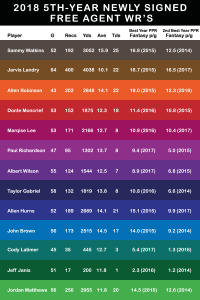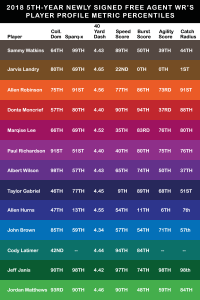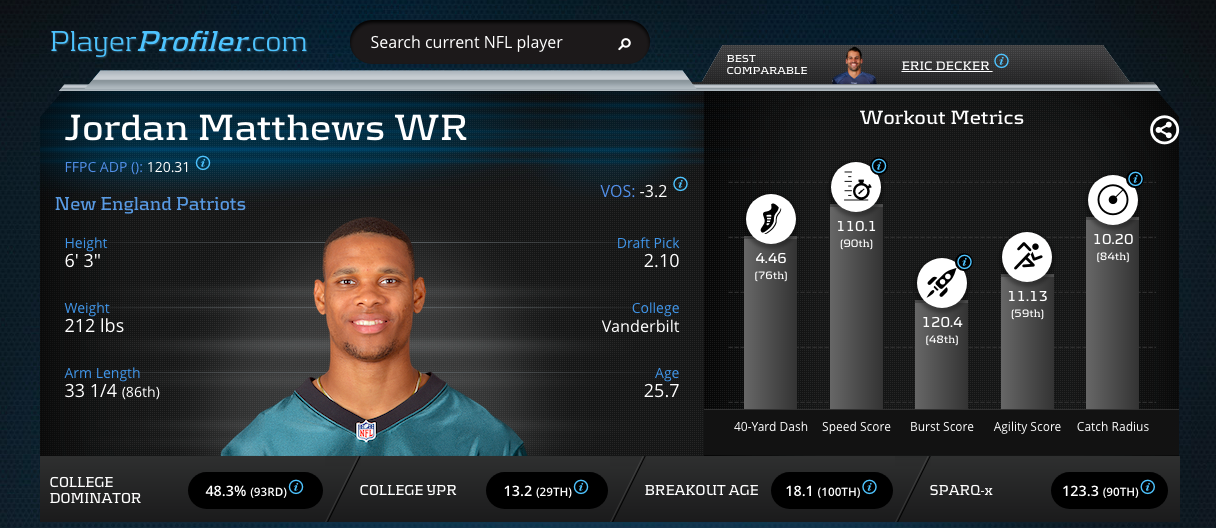At the moment twenty free agent wide receivers have signed with new teams. Apart from Jordy Nelson, Michael Crabtree, Brice Butler, Jaron Brown, Danny Amendola, Terrelle Pryor, and Kendall Wright, most free agent wide receives are entering their fifth year in the NFL. Looking back on four years of production, which free agent wide receivers are going to produce the most fantasy football points in 2018 based on advanced stats, metrics, and analytics profiles? Here are the free agent contracts signed from the most money per year to least:
- Sammy Watkins — Signed 3-year, $48M deal with KC (16M per year)
- Jarvis Landry — Signed 1-year, $15.982M deal with CLE
- Allen Robinson — Signed 3-year, $42M deal with CHI (14M per year)
- Donte Moncrief — Signed 1-year, $9.6M deal with JAX
- Marqise Lee — Re-signed 4-year, $34M deal with JAX (8.5M per year)
- Paul Richardson — Signed 5-year, $40M deal with WAS (8M per year)
- Albert Wilson — Signed 3-year, $24M deal with MIA (8M per year)
- Taylor Gabriel — Signed 4-year, $26M deal with CHI (6.5M per year)
- Allen Hurns — Signed 2-year, $12M deal with DAL (6M per year)
- John Brown — Signed 1-year, $5M deal with BAL
- Cody Latimer — Signed 1-year, $2.5M deal with NYG
- Jeff Janis — Signed 1-year, $1.25M deal with CLE
- Jordan Matthews — Signed 1-year $1M deal with NE
Although no one can honestly say which above receivers are deals and which ones are not worth their new contracts before the 2018 season starts, it is worth looking at what they’ve done prior in order to predict. Some wide receivers have been more consistent than others during their four years in the league. Some have been great. Some have had one great year. Some have had two solid seasons. Some have done little with their opportunity. Some have had little or no opportunity. Some have trouble maintaining their health. It is also beneficial to surmise that receiver’s advanced stats and metrics profile, and see if he is athletic and/or dominant. And of course, the last important factor is each receiver’s landing spot and if that receiver will look at 2018 as a way to ascend, maintain, or decline. All these variables help support whether or not each wide receiver will be a fantasy contributor in the upcoming season.
Production History (2014-2017)
Here is a table that illustrates the career production for each fifth-year receiver.
The most dependable and consistent contributor has been Jarvis Landry. He is the only receiver who has played over 60 games, therefore indicating that he does not get hurt, and production-wise, has 150 more receptions then the second most receiver, Jordan Matthews, which is hugely significant. He also has almost 1,000-yards more than the next best receiver, Sammy Watkins. This is even more significant considering his 10.1-yards per reception, which is easily the lowest of the group. At the other end of the spectrum, it is easy to see why both Cody Latimer and Jeff Janis got the smallest contracts, largely due to the fact in four years, they have produced very little.
Check out Allen Robinson & Jarvis Landry on PlayerProfiler’s Updated Dynasty Rankings:
The receivers that have been the most productive based on total yards have been Landry, Watkins, Matthews, Robinson, Hurns, Brown, and Lee, with all of them surpassing 2,000-yards. However, when fantasy points are included, all but John Brown have averaged more than 10 points per game in their two best years. If the bar is raised to 12 fantasy points per game, then only Landry, Robinson, Watkins, and Matthews make the cut, managing to achieve that feat at least two out of the four years. This is important because it shows consistency and thus dependability. And dependability is an important factor when drafting a fantasy team. Therefore, one can easily conclude that only Landry, Allen Robinson, Sammy Watkins and Matthews have shown they are more productive than the other receivers and will most likely are safer bets to repeat this since their floor of 12 points per game is much more desirable. Therefore, based on production here’s the top four:
- Jarvis Landry
- Allen Robinson
- Sammy Watkins
- Jordan Matthews
Athletic Testing
Based solely on their athletic profiles, some of the receivers on the list rise are excellent athletes, some display athletic traits but tend tend to be average athletes, while the rest are below average athletes as indicated in the chart below:
Athletically speaking, Jarvis Landry who has been the most productive in the NFL, is the worst athlete, followed closely by Allen Hurns. Many of the other receivers are above average athletes including Sammy Watkins, who undeservingly is considered a great athlete. He’s fast (89th-percentile Speed Score) with an excellent 99th-percentile SPARQ-x Score but has an average to below average Burst Score, Agility Score and Catch Radius. Most wide receivers on the list tend to have a few metrics that are excellent combined with some that are average to below average. Jeff Janis is the best athlete overall, having all of his metrics above the 90th-percentile except his Burst Score, which is still respectable, in the 74th-percentile. He is followed by Allen Robinson, having all of his metrics above the 72nd-percentile. Donte Moncrief is a great athlete despite his low 37rd-percentile Agility Score. Jordan Matthews is fourth best, having great scores except a slightly below average 48th-percentile Burst Score and a slightly above average 59th-percentile Agility Score.
Therefore, based on athleticism here’s the top four:
- Jeff Janis
- Allen Robinson
- Donte Moncrief
- Jordan Matthews
Free Agent Headliner: Jordan Matthews
It is only fair that Jordan Matthews deserves his own special spot at the end. He was the last free agent out of this bunch to finally get signed. It was looking bleak for a while but in the end he ended up in arguably the best spot out of anybody, landing with the mighty New England Patriots. Many people have already started to write Matthews off, therefore, it wasn’t surprising that it took this long for him to find a new home. And as April was soon succumbing to the end of the month rookie draft, it looked more and more like Matthews was well on the way towards fading into obscurity.
What is really strange is how this wide receiver has been perceived throughout his career. Remember, he has only been around for four years. And although he has never had a 1,000 yard season and has never been elite, his first three years were nothing less than consistently solid. In his rookie year he played all sixteen games, having 67 receptions for 872 yards, averaging 13.1 yards per reception, and catching eight touchdowns. In his sophomore year, he improved slightly. He didn’t miss a game again, but this time he caught 85 balls for 997 yards, averaging 11.7 yards per reception and matching his touchdown mark set the year before. In his third season, Matthews missed two games. In fourteen games, he still managed to get 73 receptions for 804 yards. He averaged 11.0 yards per reception but this time only caught three touchdowns. If he had played the full season, he would have had another 11 receptions, with an additional 121 yards, an another touchdown based on his average that year. Therefore, he would have had a similar year to his first two. The pessimists would say he was not ascending, whereas Matthews supporters would say at least he was dependable and consistent. One important factor is in his first three successful seasons in Philadelphia, Matthews caught passes from four different quarterbacks, therefore he never had the chance to develop chemistry with anyone. In his rookie year, he caught passes from both Mark Sanchez and Nick Foles. In 2015, he had Sam Bradford, and in his final season as an Eagle, Matthews was with rookie Carson Wentz. As good as Wentz was last year, in 2016, he was wildly inconsistent, finding his way in the NFL. Now moving to play with Tom Brady can only be an upgrade.
Matthews had a strange season in 2017. It started off with there being constant rumors that he was going to be traded which didn’t help matters. That seemed to go on for months. Then finally the rumors came to fruition as Philadelphia unloaded Matthews to Buffalo. Buffalo for the past decade has been a death sentence for wide receivers so already it was not looking like a situation any good receiver would want to find himself in. To make things worse, Matthews was hurt and played hurt. No matter how good a receiver is, he should not play hurt but should take time off and get better. If a surgery is needed, then get the surgery and then heal. Unfortunately for Matthews he did neither. It resulted in him playing only ten games, getting 25 receptions for less than 300 yards and catching one lonely touchdown. Matthews also got trashed in the media who didn’t seem to care that he was playing at less than 100-percent. This caused his confidence to decrease with many having him dismissed. People failed to remember that during his prior three seasons he was one of the most reliable target hogs, instead he was viewed as a washed up receiver on his way out of the NFL. Amazing what a year can do to a guy. That caused his stock to plummet and had him waiting this off-season wondering if he was even going to play again, which is ridiculous considering it was solely based on one year’s lack of production whilst hurt, and playing for Buffalo. Luckily for Matthews, the Patriots could see through this incredulous smoke screen, patiently waiting for his stock to dive even further before getting their man.
https://www.youtube.com/watch?v=qKe2dbGr7Qs
Also understand he was playing a position that for the most part does not fit his athletic profile. Matthews has always been playing in the slot, however, he is fast enough and big enough to play as an outside receiver. Philadelphia and Buffalo for some reason have never viewed him as field stretcher. Now that he is with New England, this could change. Julian Edelman is the natural slot receiver. He is smaller, not as fast but is incredibly agile . Edelman has a 87.1 Speed Score (25th–percentile) while boasting a 10.54 Agility Score (99th-percentile). Chris Hogan is a versatile receiver who can play in multiple positions like Jordan Matthews. But again he is much slower, running a 4.55 40-Yard Dash compared to Matthews’ 4.46. Where Hogan is stronger is in his 123.4 Burst Score (64th-percentile) and his 10.90 Agility Score (83rd-percentile). Ideally, based on their Workout Metrics, Matthews, Edelman, and Hogan should be the Patriots’ X, Y, and Z receivers respectively.
Don’t forget that Kenny Britt, Malcolm Mitchell and Phillip Dorsett are on the depth chart as well. Although Britt has a decent 102.4 Speed Score (74th-percentile), it isn’t as good as Matthews 110.1 (90th-percentile). Matthews is also faster straight up, running the 40-Yard Dash a tenth of a second faster than Britt, who is also about five years older. Mitchell has similar speed to Matthews but is built more like a slot receiver. Brady also seems to prefer taller split receivers. Brandin Cooks was good last year, but paled in comparison to an outside guy like Randy Moss who was much taller. As for Dorsett, he has just never found himself at the NFL level after being drafted late in the first round. In his three years as a receiver, he has fewer receptions than Matthews did in each his first three seasons in Philadelphia. Dorsett failed to impress in New England last year, having only 12 receptions for less than 200 yards.
Even if Matthews does not ignite right away and finds himself as the potential down the field threat that he could be, he is versatile and flexible enough to adjust to whatever position he is given. Like Hogan, Matthews can really play anywhere as a receiver. So worst case scenario, Matthews will still find his way on the field, and for a measly one million dollar deal, the Patriots have done it again. (A grade)
Free Agent Landing Zones
Sammy Watkins will have a difficult time carving out his role in Kansas City. He was used to being wide receiver one during his days in Buffalo. Last year was a dose of reality as he found himself third in the pecking order as a member of the Los Angeles Rams. It is still quite amazing that the Chiefs splashed so much cash on a guy that hasn’t had a big year since his sophomore campaign. He’s got to compete with Tyreek Hill, Travis Kelce and running back Kareem Hunt, therefore his outlook does not look all that bright despite having an upgrade in quarterback, one rookie Patrick Mahomes. (C grade)
Jarvis Landry was used to being a target hog during the days as a Dolphin. However, he never really had much competition there. Now in Cleveland, he finds himself alongside Josh Gordon, a healthy (knock on wood) Corey Coleman and a hungry Jeff Janis waiting in the shadows. He will most likely get the most targets, but it seems likely his amount of targets will not be in the same hefty range when he was in Miami. Look for his production to be slightly less as the best case scenario for Landry. (B- grade)
https://www.youtube.com/watch?v=px3WP43fu0c
Allen Robinson is coming back from a significant injury that took him out of last season entirely. He’s also on a Bears team that has aggressively been busy improving its receiving core, therefore in order for Robinson to get his, he will have to work for it. That being said, he has already been touted as second-year quarterback Mitchell Trubisky‘s leading target. Trubisky will be better but how much better, is hard to say. Most likely Robinson won’t find that 2015 magical year again in 2018 but should be more productive than not. He’s just too athletic and explosive to ignore. (B+ grade)
Donte Moncrief has never been that productive, whether is was in college (57th-percentile College Dominator Rating) or in the NFL. He had a couple of decent years with Andrew Luck when he was in Indianapolis but now finds himself trying to find chemistry with sub-par quarterback Blake Bortles. He also has to compete with Marqise Lee, Dede Westbrook, and surprise rookie sensation Keelan Cole for targets. This does not bode well for Moncrief considering Jacksonville will be a run-first offense, as well as relying on their stacked defense to win games. (D- grade)
Marquise Lee has a better chance at being fantasy relevant than Moncrief since he has been in the system longer and has shown that he can be productive despite playing with receivers that might be as good or better than him. He should maintain in 2018, which won’t make any fantasy manager happy or sad. He’s the type of guy one picks up with very little interest or excitement. At least he won’t surprise anyone one either way. (C grade)
Paul Richardson received a surprisingly generous contract based on one relatively productive year in 2017. He might have wowed Washington but still has a long way to go to prove himself as a dependable receiver. He’s fast and athletic but has lacked consistency even when healthy. Perhaps he can be the very poor man’s version of Tyreek Hill but needs to establish a good relationship with Alex Smith who has not been a willing deep passer throughout his career in San Francisco and Kansas City. Even if he has a few break out games, he won’t produce consistently. Having a guy like that is a fantasy headache. (D+ grade)
https://www.youtube.com/watch?v=PRhWhWaXTSY
Albert Wilson can surprise many only if he is treated like the departing Jarvis Landry. Wilson will need to command target share like he did in college (98th-percentile College Dominator), not like he did in Kansas City. Unfortunately, the Dolphins have also signed the more experienced and more dependable Danny Amendola, who also fits the slot role. It’s hard to say if Kenny Stills or DeVante Parker will also take on larger roles with a returning Ryan Tannehill at the helm. Considering Wilson signed a rather lucrative deal, it seems that he will factor in their plans but since he has never really been a number one or a number two, it is hard to believe that he will ascend to great heights. And remember, it is still the Miami Dolphins. (C- grade)
Taylor Gabriel seems to produce at a high level every other year, especially when he is starting with a new team. In his first year in Cleveland, Gabriel was productive but it dwindled in the next year. In his third year he moved to Atlanta, really pouring it on in the second half. Last year he was a shadow of the year before. So which Gabriel will show up in year five? He’s moving to a new city and based on his short career history, trends indicate that it should be a good one. He will never be the go-to guy but is an exciting gadget-type guy that can make something out of nothing. He has Allen Robinson ahead of him, but now that Cameron Meredith is gone to New Orleans, Taylor Gabriel could be interesting. (C+ grade)
Allen Hurns is pretty much “just a guy” who finds himself in a pretty good situation. All indications are pointing to the fact there is a good chance Dez Bryant is on his way out. If that is the case, this bodes well for Hurns who would find himself as the big man in Dallas, ahead of Terrance Williams, Deonte Thompson, and Cole Beasley. Hurns has produced better than his athleticism would indictate. However, if Dez does go, expect the Cowboys to find a better replacement number one than Allen Hurns in the draft. (C grade)
John Brown is a rather deceptive wide receiver. It is surprising that out of the thirteen wide receivers, he has played tied for third with most games played. He always seems to be injured or sidelined due to his sickle cell condition. Despite playing more than it seems, apart from his 2015 breakout year, Brown has done very little to instill confidence that he is a potential elite receiver. That is perhaps why the Ravens only were sold on signing him for one year. Since Baltimore has had a receiver exodus of late, Brown could regain his form of three years ago. However, it is a more likely scenario that he fades in and out of the line up, more out than in. (D+ grade)
https://www.youtube.com/watch?v=7pvYmQAIQX0
Cody Latimer has been a major disappointment in the past four years and stands as one of many John Elway’s draft disasters. As a second round pick he really hasn’t amounted to anything. It is a shame because he is really fast (94th-percentile Speed Score) for a 6-2 215-pound receiver. The optimist would declare that he started to come alive last year, yet the realist would retort that he is going to the New York Giants, a team who is trying to redefine their culture but seems to be lacking an identity not even knowing what to do with Odell Beckham Jr. Perhaps a new landscape is what Latimer needs. However, with an aged quarterback and a team in disarray, he is not the answer, nor will he be a fantasy asset. (D grade)
Jeff Janis is another receiver who is looking forward to rediscovering his mojo after four miserable years with the Green Bay Packers. Unlike Latimer, Janis was a seventh-round pick who never found himself more than a special teams guy. He does have a cult following among many fantasy football analysts, therefore he has a contingent really pulling for him. He hopes that Hue Jackson is a bit more open-minded than Mike McCarthy was and he at least gets a chance to play. He will have get on by luck or injury, rather than just leapfrogging the likes of Jarvis Landry, Josh Gordon, or Corey Coleman. Chances are he might just get his wish considering Coleman’s track record of stumbling into every kind of injury possible. He just has to spend some extra effort learning his routes, thereby hushing all the critics. (C+ grade)
Conclusion
Although most would say that the smart money would be put on Allen Robinson as the wide receiver free agent signing of the summer, one needs to give Jordan Matthews the same consideration. Sure, the Chicago Bears, like the Cleveland Browns find themselves aggressively trying to change their fortunes after a dismal 2017 season. But even with an older Tom Brady, New England is still one of the best places to land as a wide receiver. Bill Belichick sees something in Matthews that most aren’t seeing at the moment. It isn’t rocket science. It’s just football.
While other teams, like Washington, are constantly falling prey to recency bias by getting Alex Smith and Paul Richardson, the Patriots still follow the similar old school approach to finance. Look for the stock that is at its lowest point and buy into it. This stock has been valuable before and shows the ability to climb again. Buy low and see if it will increase in value. He was a once coveted commodity that finds his value low right now. But he isn’t done yet, and at only 25 years of age he is going to find his rebirth in New England. Jordan Matthews has the athleticism and past production to become one of this year’s sleeper. With the right coaching, the correct opportunity, he will rise again and help a great team maintain its position as the best AFC team in football, with the same dream of making it back to Super Bowl. And as an added bonus, he will be the stock to own in all dynasty and redraft leagues. Get him now before the rest of the world figures it out.






